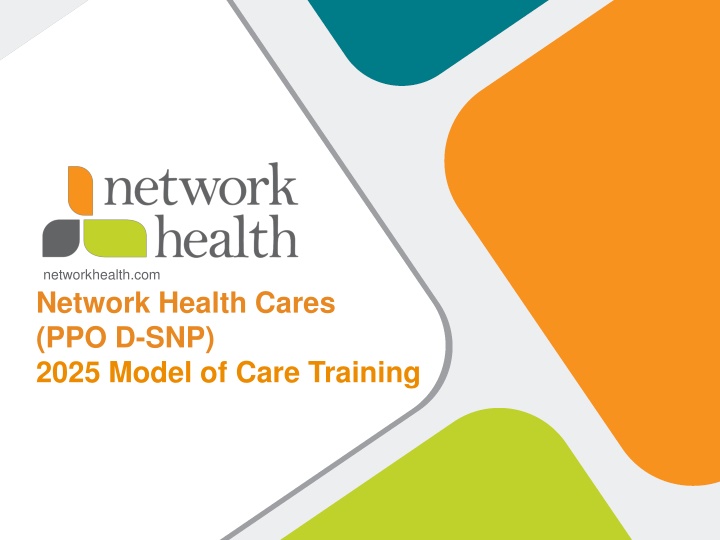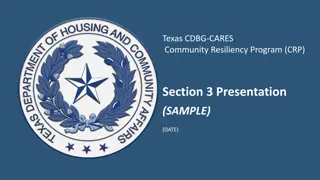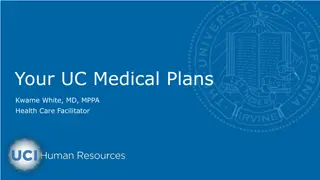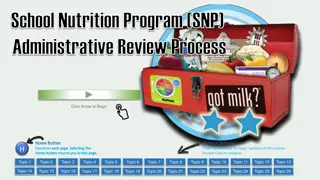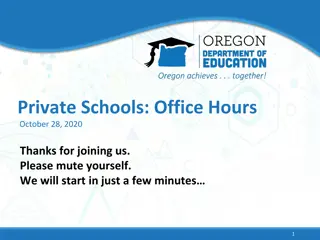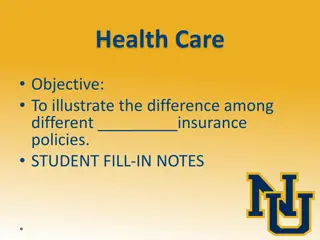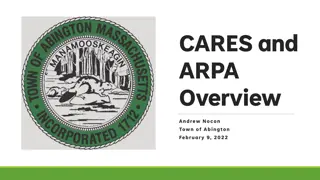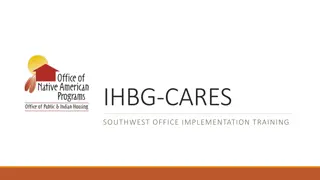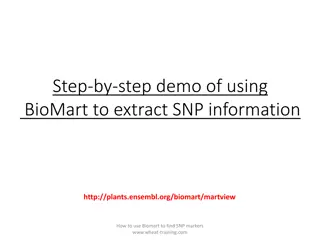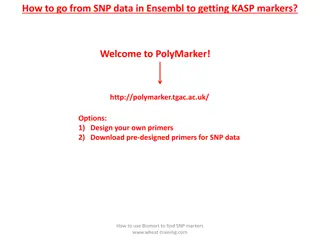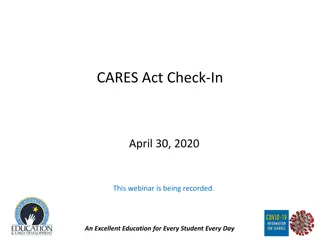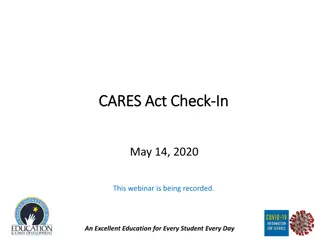Network Health Cares (PPO D-SNP) 2025 Model of Care Training
Special Needs Plans (SNPs) under Medicare Modernization Act provide dual-eligible coverage through plans like Network Health Cares. This plan offers reimbursement for necessary Medicare-covered benefits in a wide service area, ensuring members' rights and protections. With the flexibility of a PPO, members can choose their providers, receive extra benefits like dental and vision, and benefit from a coordinated care model that focuses on improving access, affordability, and care coordination for vulnerable Medicare beneficiaries.
Download Presentation

Please find below an Image/Link to download the presentation.
The content on the website is provided AS IS for your information and personal use only. It may not be sold, licensed, or shared on other websites without obtaining consent from the author.If you encounter any issues during the download, it is possible that the publisher has removed the file from their server.
You are allowed to download the files provided on this website for personal or commercial use, subject to the condition that they are used lawfully. All files are the property of their respective owners.
The content on the website is provided AS IS for your information and personal use only. It may not be sold, licensed, or shared on other websites without obtaining consent from the author.
E N D
Presentation Transcript
networkhealth.com Network Health Cares (PPO D-SNP) 2025 Model of Care Training
What is a Medicare Advantage Special Needs Plan? Special Needs Plans (SNPs) were created by Congress as part of the Medicare Modernization Act (MMA) of 2003, as a new type of Medicare-managed care plan focused on certain vulnerable groups of Medicare beneficiaries Network Health offers a dual-eligible SNP (D-SNP), called Network Health Cares, which includes individuals who are enrolled in Medicare and Medicaid Network Health Cares provides reimbursement for all medically necessary Medicare-covered benefits 2 2
Network Health Cares (PPO D-SNP) Eligibility and Membership Must live in Network Health s 18-county northeast Wisconsin service area Must have Medicare Parts A and B and Medicaid from the state of Wisconsin Members are still in the Medicare program, have Medicare rights and protections and receive all regular Medicare covered services 3 3
What is covered by Network Health Cares? Because this is a PPO plan, members can use any provider who accepts Medicare and Medicaid The plan provides reimbursement for all medically necessary covered benefits, in- or out-of-network Medicare s coverage rules determine which services are medically necessary Medicare (Network Health Cares) is the primary insurance and pays first Then Medicaid pays up to the Medicaid-approved amount Providers should not bill the member any unpaid balance Extra benefits include dental, vision, hearing and more Go to networkhealth.com/medicare/extra-benefits-snp for more information 4 4
D-SNP Model of Care Goals Improve access and affordability of health care needs Improve coordination of care through the direct alignment of the health risk assessment, individualized care plan and interdisciplinary care team Enhanced care transitions across health care settings and providers for all D-SNP members Ensure appropriate utilization of services for preventive health and chronic conditions 5 5
D-SNP Care Coordination The Centers for Medicare & Medicaid Services requires D-SNP members to be managed by using the following. Health Risk Assessment (HRA) Initial HRA must be completed within 90 days of member s effective date Annual HRA must be completed within 365 days of the previous HRA Individualized Care Plan (ICP) Interdisciplinary Care Team (ICT) Annual face-to-face visit 6 6
Health Risk Assessment A member of the Network Health Cares team contacts members to complete their HRA via phone The member s assigned SW or RN is responsible for reviewing, analyzing and stratifying health care needs The member s assigned SW or RN discusses with the member/member representative, by phone or in person, the HRA results as a basis for developing or modifying an individualized care plan 7 7
Individualized Care Plan ICP Review The member s assigned SW or RN reviews, updates and/or implements an ICP with the member/responsible party at least annually or as needed, if the member s condition(s) change ICP Communication The ICP and revisions are communicated by the member s assigned SW or RN to the member/member representative by phone, electronically, fax or mail The RN or SW may also contact the community care partner and/or network providers by phone, fax or mail as a result of the communications plan developed during the care planning session with the member or member representative 8 8
D-SNP Interdisciplinary Care Team Every Network Health Cares member has an Interdisciplinary Care Team (ICT) that can vary depending on the needs of the member. Composition of the ICT The member The member s assigned care manager (RN or SW) The member s personal doctor Any as needed participants Examples of as needed participants Community care partner Restorative health specialist (physical, occupational, speech) Home care nurse, home health aide, community resources Pharmacist, dietitian, nutritionist Specialist physicians 9 9
Care Transitions Care Transitions Process The assigned RN or SW will attempt to contact all D-SNP members within three business days of notification from a care transition A care transition may include, for example, planned or unplanned inpatient hospitalization, observation, skilled nursing facility stay or emergency department visit The assigned RN or SW and member/member representative will work together to update the member s ICP ICP will be communicated to applicable members of the member s ICT 10 10
Annual Face-to-Face Encounter All D-SNP members are required to have a face-to-face encounter in-person or through a visual, real-time, interactive telehealth encounter Face-to-face encounters must occur at least annually Network Health Cares promotes the annual wellness visit, conducted by the member s personal doctor as the primary form of a face-to-face encounter If the member does not complete an annual wellness visit, any other personal doctor visit is considered a qualifying face-to-face encounter 11 11
What is the Care of Older Adults (COA) Measure? The intent of this measure is to ensure that older adults receive the care they need to optimize their quality of life. As the population ages, physical and cognitive function can decline, and pain becomes more prevalent. Older adults may also have more complex medication regimens. Screening of elderly patients is effective in identifying functional decline. Eligible Population Medicare-special needs population 66 years of age and older as of December 31 of the measurement year Exclusion Members who received hospice care anytime during the measurement year Members who deceased during the measurement year 12 12
CMS Star Measures Dual-Eligible Special Needs Plan (D-SNP) 2025 Star Rating* (Rated on a scale of 1 through 5, with 5 being the best) SNP Care Management 4 Star COA-Pain 5 Star COA-Med review 5 Star For more information on HEDIS measures please visit our website: networkhealth.com/provider-resources/quality-health-integration *The Network Health Medicare Advantage 2025 PPO plans earned a 5 Star Rating overall. 13 13
Network Health Cares contacts Laura Reinsch, Director of Care Management 920-720-1602 ext. 01711 lreinsch@networkhealth.com Amanda Campbell, D-SNP Manager 920-720-1602 ext. 01533 acampbel@networkhealth.com Every year, Medicare evaluates plans based on a 5 Star rating system. H5215_2264-07-1124_C
